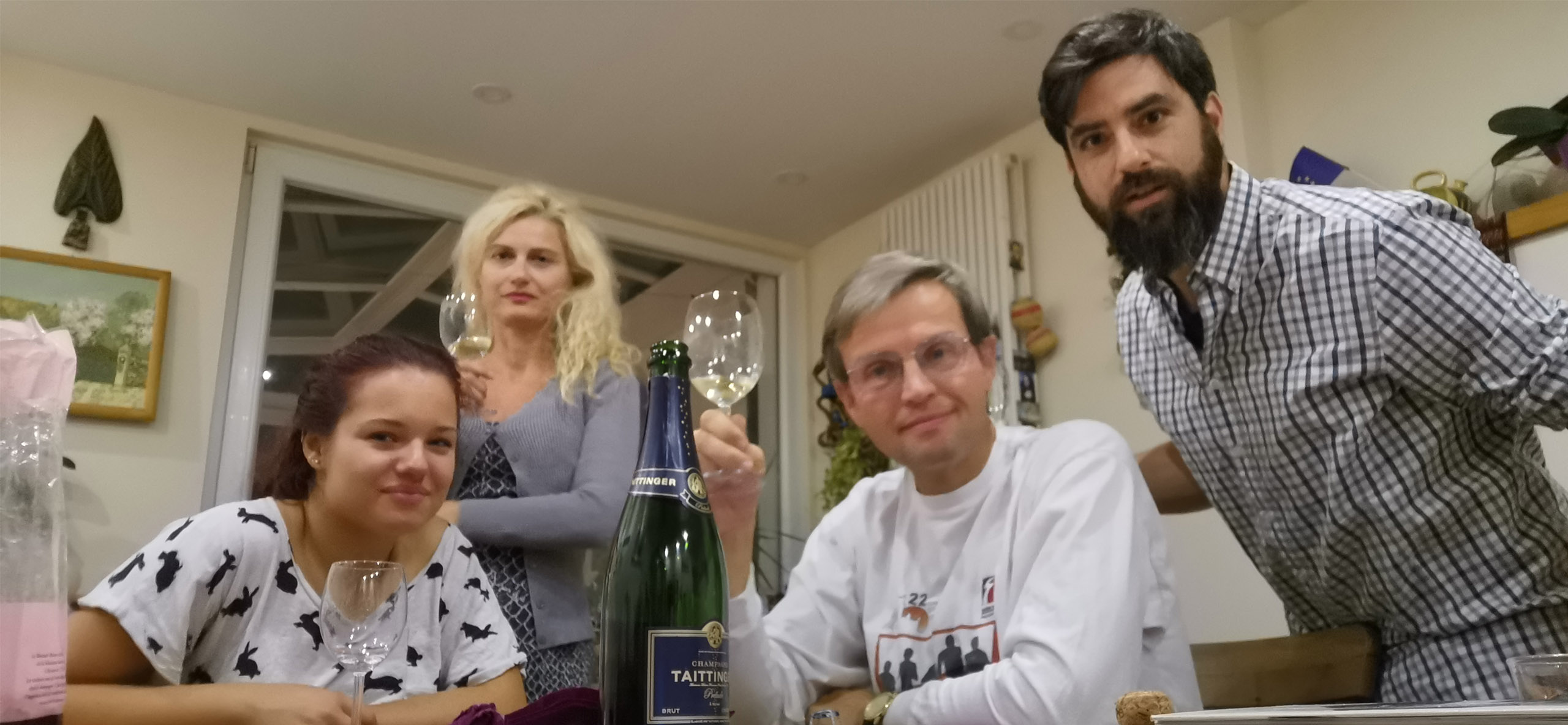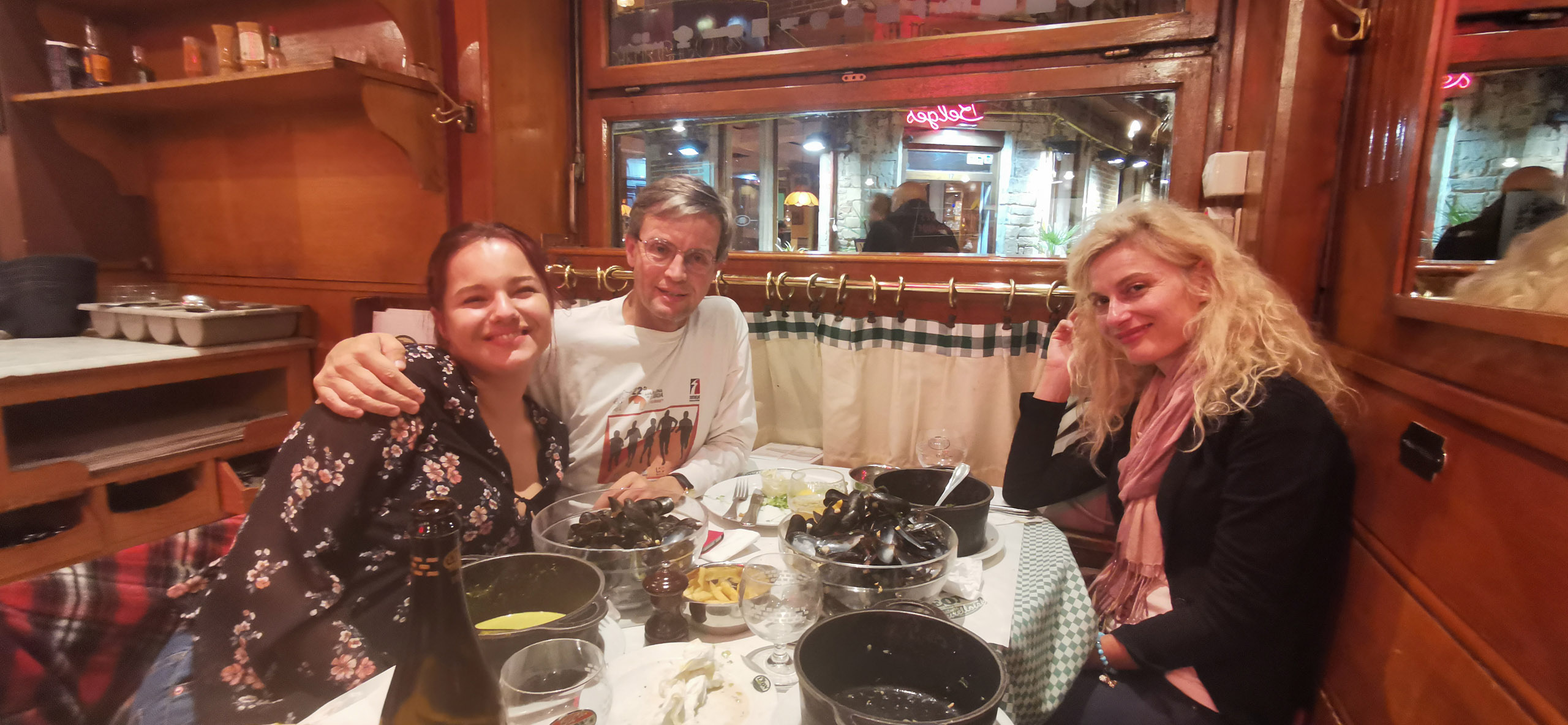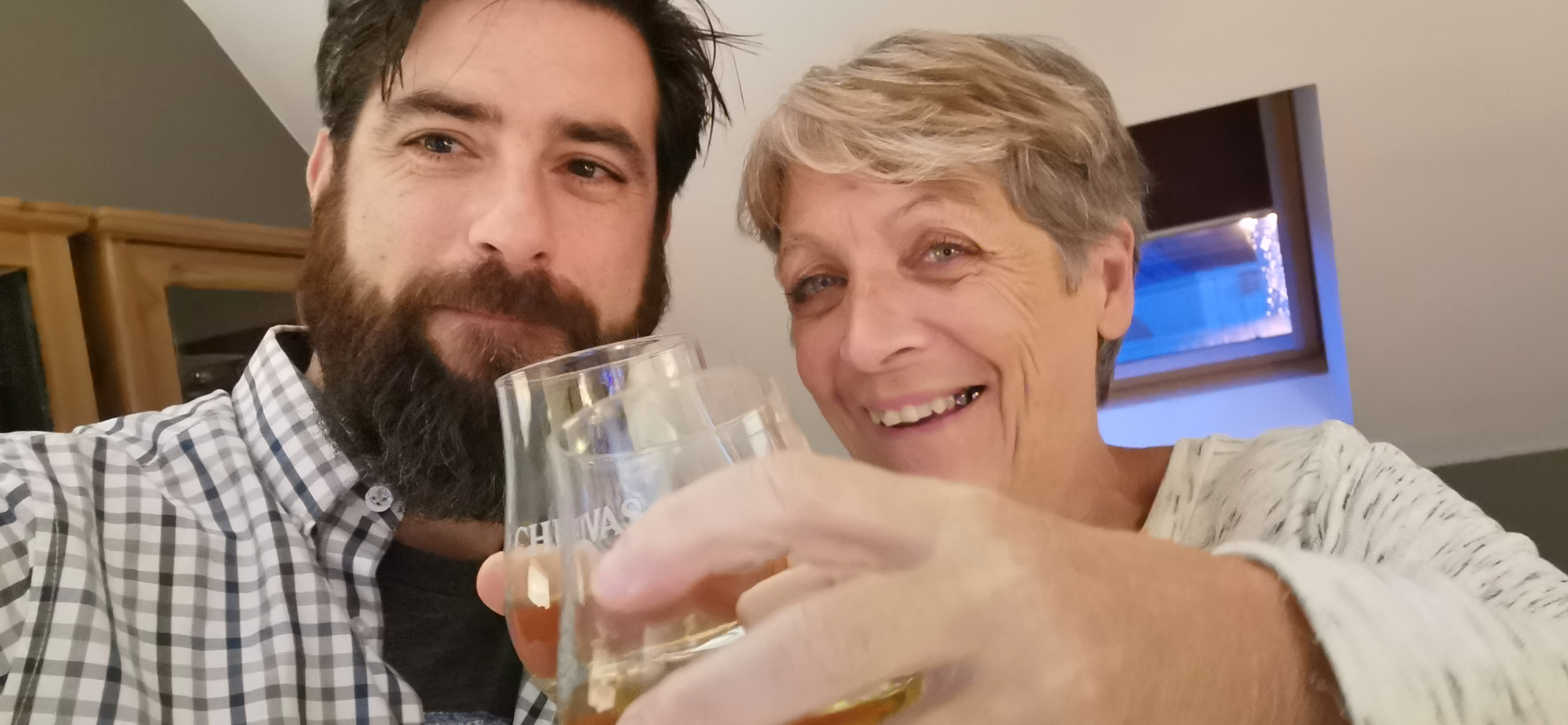Catching Up With Old Acquaintances

I had been tracking flights to Cyprus for months. It seemed off the beaten path and a good gateway to the Middle East so I had fixed it on my mental itinerary. Because I needed to return to Canada via Paris, I knew that I somehow needed to get from Paris to Cyprus, and one particular flight from Brussels to Larnaca, for only 20 euros, seemed like the best bet. The only problem was timing – for a long time the flight was months away with too many things in between to commit to it.
*
I met Lothar when I was just 8 years old. In his late teens, he was doing various visits around North America and one of his stops was to visit our family in Montreal. His family were distant relatives, who in 1956 were living in Austria, and when my grandparents fled Hungary after the revolution it was with Lothar’s family that they first sought refuge. Lothar came to visit us again while I was attending university. He had just gotten married and a visit to Canada was added to the honeymoon. Now in my early twenties, I was able to form a solid picture of Lothar, unlike when I was just an eight-year-old and I could only cling to faint images and feelings. By now the age gap had narrowed and we could drink and laugh together. But our relationship really blossomed in 2003 when he was on assignment in Bulgaria working for the EU and helping the Bulgarian government meet the criteria for their acceptance into the Union. I had just finished working for a year in Korea and took three months to explore eastern Europe adding Sofia to my places to visit, and staying with Lothar while I was there. Because of his job, there were all sorts of panels and workshops and galas to attend. He also made me his driver when he had to travel from Sofia to Ruse in the north, right by the Romanian border, and, at the time, it was my first experience driving a manual transmission car. I stalled often and it gave me anxiety. To combat this, Lothar reminded me: “Relax, I have red diplomatic plates. I could park the car in the middle of the main square and there would be no consequences”. Lothar didn’t like driving at night, and his primary area of expertise was delegating work, which is why he handed over control of the driving to me in the first place. And then years went by and we lost touch.
My grandmother had a childhood friend who she knew all the way back from primary school in Hungary, named Kati. Kati, though Hungarian, lived in Brussels and came to visit us once every couple of years during my early childhood. What I always remembered about her was the fact that she always brought different varieties of Côte d’Or Belgian style milk chocolate for my brother and I. The first time I travelled to Europe I was so out of sorts and really afraid for the first time in my life. After a week in Paris, with sore feet and still suffering from jet lag, I hopped on a bus to Brussels and showed up, virtually unannounced, at her door seeking respite and a friendly face. Though she was the same age as my grandmother, by 1999 she seemed much older, and my being there was a bit of a problem. Probably out of a sense of duty and love for my grandmother she let me stay for a few days which helped me to finally get on my feet and get adjusted to life in Europe, but soon after she politely suggested that I should probably be on my way. There was an overnight bus headed to London but no seats available. The clerk at the Eurolines office said, though, that if I presented myself to the bus driver that there would be a seat available and that I could pay the driver directly. On a cold night in early February, Kati’s daughter, Kis Kati (Little Kati) came to collect me to take me to the Gare du Nord to wait for my bus. Kis Kati knew my mother well and the two of them had travelled parts of Europe together in their early twenties, but, until that night, Kis Kati had been unaware that had I come to visit. She was concerned that I had been told that there were no tickets for the bus and she waited there with me for over an hour until things got sorted out. The whole time she kept saying: “You should have let me know, it would have been so much better if you had stayed with me”. Sure enough, I was able to get a ticket straight from the driver, just as the clerk at the ticketing office had said, and I was off to London. Kati died of cancer only a couple of years later. And then years went by and Kis Kati and I lost touch.
*
By the time I returned from Canada to Paris, the flights from Brussels to Larnaca had shot up to well over 100 euros so I had to entirely rethink my route. I discovered that I could travel, instead, from Brussels to Budapest for 30 euros, and then from Budapest to Paphos, on the west coast of Cyprus, for another 50. This plan ticked a lot of boxes: 1) I could still get to Cyprus; 2) I could make a quick surprise stop in Hungary and visit some family and my mom who was visiting at the same time; 3) I could still get to Brussels. While back in Canada I got back in touch with Lothar over social media. He had just finished a two-year assignment in Madagascar and returned to his home in a borough of Uccle called St. Job, just outside of Brussels, at about the same time as I was returning to Europe from Canada. Through my cousins, in Hungary, I was able to get in touch with Kis Kati who had recently retired from her job working for the Mercedes automobile company and now lived in Rhode St-Genese just on the outskirts of Brussels a few kilometres north of Waterloo, and about 10-minute train ride from Uccle.
I travelled east, for about a week, from Paris to Alsace and then headed north through Luxembourg and then up to Namur and over to Brussels where I met Lothar not too far from his office downtown. We hadn’t seen each other in over 15 years. So much had happened to us over that time, and there was some catching up to do, but we barely got to it because the relationship felt like it hadn’t changed and so our conversation kept diverting off into different directions. He outfitted me with a travel card and moved me into his house in Uccle where he had houseguests including his Bulgarian wife’s daughter from another marriage, Vassilena, and a family friend from Bulgaria, Zaritza. Lothar had recently made a small trip to Reims where he had bought some champagne, so I was feted upon my arrival. The four of us formed a unique new little family for a short time in that house. There were dinners out at Nemo33 and Chez Leon for moules et frites, parties with ambassadors and delegates from Mozambique, and chit chats over beers and Bulgarian banitza.  But it was while out in downtown Brussels that Lothar and I who, unlike with Vassilena and Zaritza, had a past that we could reminisce about, that we really got to catch up. Maybe we were just lost in our little world but it seemed that every 100 meters or so we were ducking into another coffee shop or beer hall for an espresso or a beer or some cheese or something else. I’m tight-fisted with my money and deliberate for eons over every little purchase that I make, but if Lothar wants something he just gets it. As a result, at some point, there we were in a coffee shop sending back sangria for some reason and being served vermouth and cake – when you’re with Lothar things like that just happen. A lot had happened in the intervening years and it was only then that he finally got the news that my father had passed away three years earlier. His children were living in Vienna and he often travelled back and forth to visit them and their mother. Before Madagascar, he had been stationed in Sierra Leone at the height of the Ebola crisis. He had separated from his first wife – the one who had come with him to visit us in Montreal – at around the same time that I was visiting back in 2003. Even while I was visiting him in Uccle, he and his current wife were going through issues but none of it seemed to bother him. It was like I was at the wheel again driving through Bulgaria and panicking because I didn’t know how to operate a manual transmission car and he just seemed to not have a care in the world. It was a particular talent of Lothar’s to simultaneously care, but not be bothered. It was a quality, I’m sure, that made him particularly effective at his job. While visiting a bookstore on our trip into the centre-ville he picked up various travel guides about Eritrea – likely his next assignment.
But it was while out in downtown Brussels that Lothar and I who, unlike with Vassilena and Zaritza, had a past that we could reminisce about, that we really got to catch up. Maybe we were just lost in our little world but it seemed that every 100 meters or so we were ducking into another coffee shop or beer hall for an espresso or a beer or some cheese or something else. I’m tight-fisted with my money and deliberate for eons over every little purchase that I make, but if Lothar wants something he just gets it. As a result, at some point, there we were in a coffee shop sending back sangria for some reason and being served vermouth and cake – when you’re with Lothar things like that just happen. A lot had happened in the intervening years and it was only then that he finally got the news that my father had passed away three years earlier. His children were living in Vienna and he often travelled back and forth to visit them and their mother. Before Madagascar, he had been stationed in Sierra Leone at the height of the Ebola crisis. He had separated from his first wife – the one who had come with him to visit us in Montreal – at around the same time that I was visiting back in 2003. Even while I was visiting him in Uccle, he and his current wife were going through issues but none of it seemed to bother him. It was like I was at the wheel again driving through Bulgaria and panicking because I didn’t know how to operate a manual transmission car and he just seemed to not have a care in the world. It was a particular talent of Lothar’s to simultaneously care, but not be bothered. It was a quality, I’m sure, that made him particularly effective at his job. While visiting a bookstore on our trip into the centre-ville he picked up various travel guides about Eritrea – likely his next assignment.
Over the weekend, while Lothar had travelled back to Vienna to visit his children and his siblings, as well as vote, I made a point to travel out to Rhode St-Genese to visit Kis Kati. In the case of Kis Kati, we were rebuilding a connection that had only faint traces of feelings and distant memories. When I wrote her, she even admitted she couldn’t recall sitting with me at the bus station that night 20 years earlier, but we knew enough of the same people and had enough of a history to make catching up worthwhile even though I had my own apprehensions that we’d quickly run out of things to talk about. She met me at the train station and invited me to her house where we spent a short while catching up on loose ends and bringing together all the stories of who knew who and where all the so-and-sos that we both knew ended up. I told her stories about my travels and she told me stories about when my mother visited Europe in the early seventies and they travelled together. We walked the battlefield at Waterloo and went out for a beer and a snack at a nearby Brasserie.  She had recently taken up an interest in wine and spirits so there were lots of little alcoholic treats at her house to toast over. In good Hungarian fashion, she had even prepared a gulyás soup in my honour. Suddenly it was night time and I had to make sure that I caught the last train back to St. Job. The whole day had passed and there was never a silent moment between us. It had been twenty years, and even twenty years ago I had barely known her. She and I had only ever shared one memory together and neither of us really remembered it with any clarity. But because almost one hundred years ago her mother and my grandmother had gone to school together and been friends, we could sit there and share food and drink and good stories.
She had recently taken up an interest in wine and spirits so there were lots of little alcoholic treats at her house to toast over. In good Hungarian fashion, she had even prepared a gulyás soup in my honour. Suddenly it was night time and I had to make sure that I caught the last train back to St. Job. The whole day had passed and there was never a silent moment between us. It had been twenty years, and even twenty years ago I had barely known her. She and I had only ever shared one memory together and neither of us really remembered it with any clarity. But because almost one hundred years ago her mother and my grandmother had gone to school together and been friends, we could sit there and share food and drink and good stories.
It rained a lot in Brussels during my visit. Chasing summer, it had been a long time since I had seen much rain and as I travelled to Charleroi to catch my flight, as droplets speckled the window of the train, I spent most of the ride thinking about the people I just had the chance to spend time with. The threads that wove our stories together were loose, and before I reached out they were frayed. They were neither the family or close friends that I had shared all of my days and nights with growing up and with whom the soils of our bond was continually watered. These friendships, whose roots were formed almost a century ago by my grandmother, were at risk of drying up. Acquaintances are easy to build, but difficult to maintain. Each of us will have hundreds and thousands over the course of our lives and, as the years pass, from the time spent apart, that feeling of connection will fray and loosen and the memories will dry and crack, leaving gaps in the narrative. But I’ve discovered that it only takes a few nurturing drops for the cracks to fill and for life to spring back into fertile soil, and the roots of old memories dig in a little deeper and new branches form. It only takes those few nurturing drops to remind one of the seasonality of life and the promise of future memories turning old acquaintances into lifelong friends.